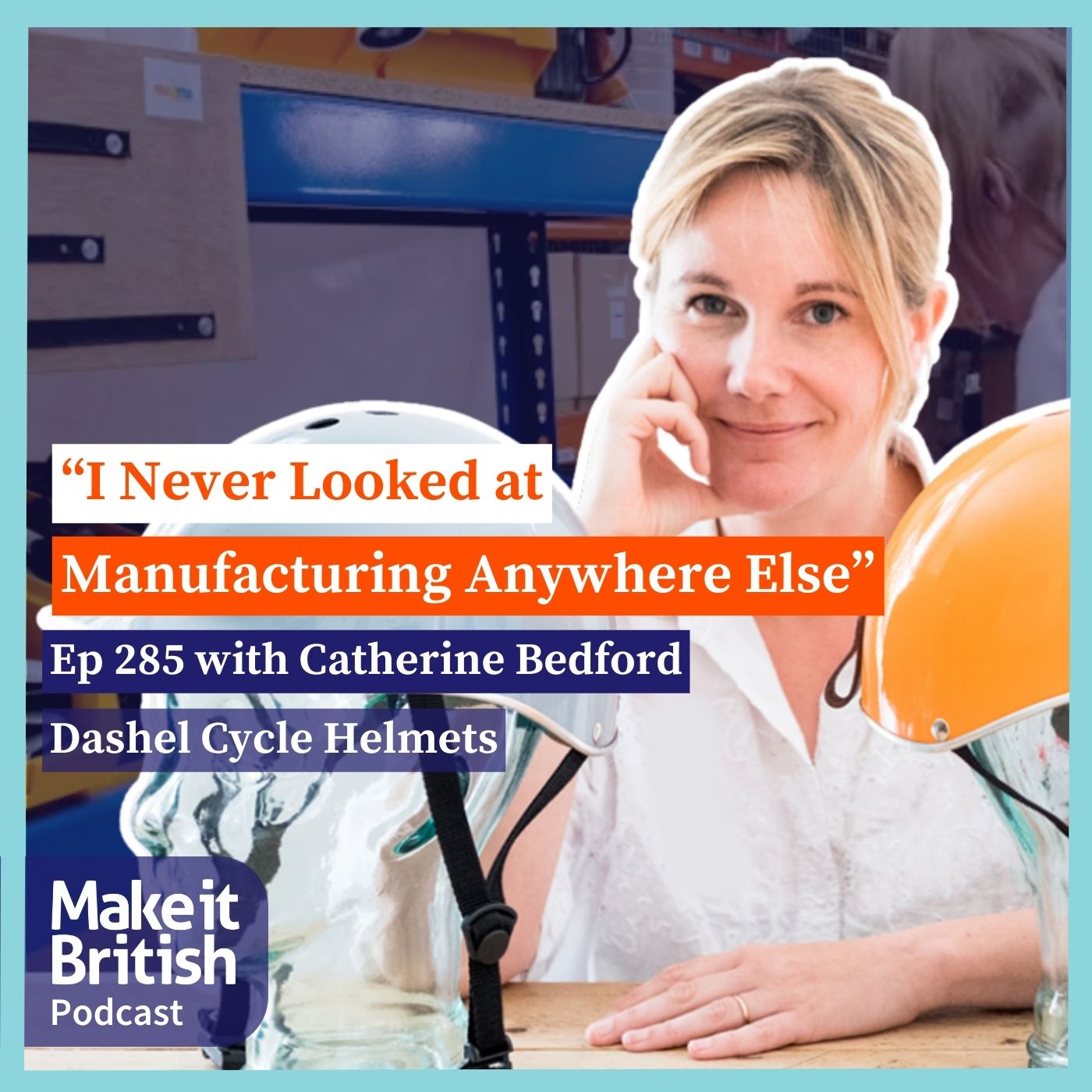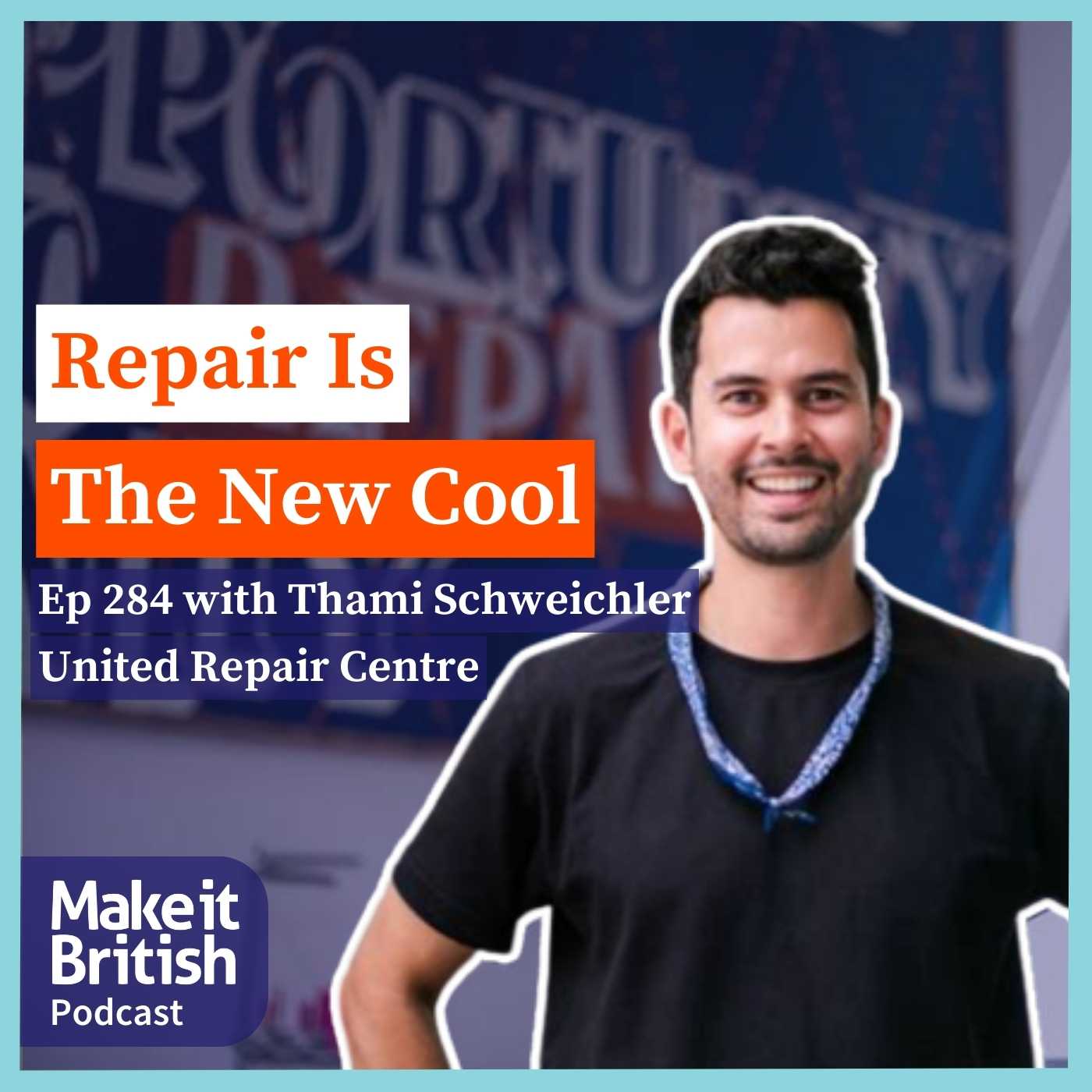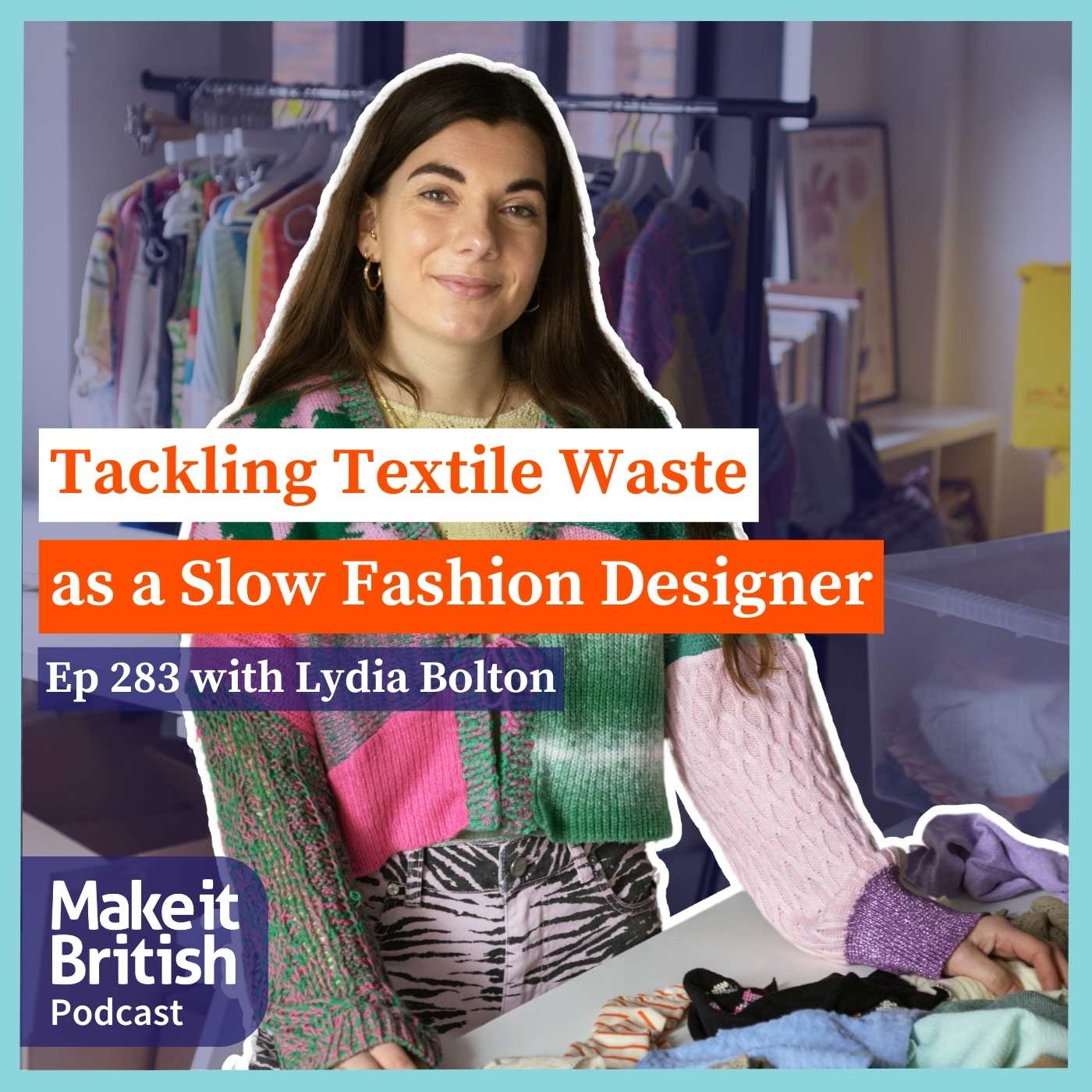Discover Make it British Podcast
Make it British Podcast

Make it British Podcast
Author: Kate Hills
Subscribed: 409Played: 10,177Subscribe
Share
© Copyright 2024 Kate Hills
Description
Kate Hills is on a one-woman mission to save UK manufacturing.
In this podcast she shines the light on British brands and manufacturers, and goes behind the scenes of their businesses.
With tips, hints and tricks to help you manufacture in the UK and buy British.
Never has there been a more critical time to get behind 'made in Britain'.
In this podcast she shines the light on British brands and manufacturers, and goes behind the scenes of their businesses.
With tips, hints and tricks to help you manufacture in the UK and buy British.
Never has there been a more critical time to get behind 'made in Britain'.
300 Episodes
Reverse
One of the questions that came up on one of our recent British Brand Accelerator group coaching calls was so good, I thought I'd bring it to you on the podcast this week.The question was about whether a small business that makes in the UK should be offering a discount when someone opts in to their newsletter, and whether this strategy works.It opened a whole discussion amongst the group about the pros and cons of discounting and other ideas for getting potential customers to sign up to your newsletter.So if you are wondering the same thing about discounting, this episode is for you!Sign up the the British Brand Accelerator waitlist here - www.makeitbritish.co.uk/waitlist
This week I’m bringing some very sad news - that the UK’s only cotton spinning mill, English Fine Cottons, which brought cotton spinning back to Greater Manchester in 2018, has very sadly gone into administration.In case you don’t know about the history of English Fine Cottons, it was set up by the technical textile spinners Culimeta-Saveguard, who invested £4.8m of its own money, £2m of which was a loan from the Greater Manchester Combined Authority, to regenerate a former Victorian cotton mill and install new technology to create luxury yarn. A further £1m was awarded as a grant by the N Brown Textile Growth Programme.English Fine Cottons was the start of something very exciting in UK manufacturing, and for this to have happened is tragic. The collapse into administration is caused by the parent group Culimeta-Saveguard going down, and unfortunately that has taken the cotton spinning down with it. Something needs to be done to save our only cotton spinning mill, otherwise this is history repeating itself.So today's episode is a remastered version of a visit that I did to English Fine Cottons in 2019, along with an interview with Andy Ogden, who was the general manager at the time.
Today's guests are Andrea and David Courtney from Courtney & Co buttonmakersBack in 2012 I was contacted by someone who was trying to save the UK’s last remaining horn button maker - Grove & Sons. He was looking for investors to buy up the machinery and pattern books from the business so that the art of natural button making in the UK was not lost.Well it turns out that the investor that this guy eventually found was someone called David Courtney, who saw an ad to buy the machinery and patterns, and decided that he wanted to help.But things are never as easy as the seem, and this initial investment took David Courtney down a very long and winding path to bring button making back to the UK.Over a decade later and David Courtney now has an amazing button-making factory in the Cotswolds, with state of the art machinery, producing buttons from 3 different types of materials. He’s also enlisted his lovely wife Andrea to head the factory up, and they now supply the most beautiful buttons to brands and designers wanting an authentic UK-made button, still made using the original patterns that David saved from Grove & Sons.This interview was recorded onsite in their factory in Bourton-on-the-Water, Gloucestershire, and Andrea and David recount the full tale of how Courtney & Co buttons got to where they are today.About Courtney & CoCourtney & Co WebsiteCourtney & Co on InstagramFURTHER RESOURCESQuiz: Are you ready to work with a UK factory? HANDY LINKSBritish Brand AcceleratorMake it British WebsiteYouTubeInstagram
This episode celebrates 15 years since I registered the domain makeitbritish.co.uk and busts some of the myths about UK manufacturing.You'll find out:Why I started Make it British and why I'm such a firm believer in UK manufacturing.The current UK manufacturing landscape.How the UK fashion and textile industry is made up of 1,000s of micro factories.How many garment factories there really are in the UK.The benefits of making in the UK.And why supply on demand is best done locally.To see the video recording of this talk, go to makeitbritish.co.uk/microfactoriesWant to work together? Fill in this form so I can find out more about your business goals, and I'll get back to you with ways I can help.FURTHER RESOURCESQuiz: Are you ready to work with a UK factory? HANDY LINKSBritish Brand AcceleratorMake it British WebsiteYouTubeInstagram
Christopher Nieper OBE is the managing director of David Nieper, a womenswear business in Alfreton in Derbyshire. The firm was set up by Christopher's parents sixty years ago and is now one of the most vertical textile operations in the UK. Christopher recently invested in state-of-the-art digital printing equipment so that the factory can print it's own fabric onsite. David Nieper already prints all their own catalogues and produce their own knitwear in house, alongside the garment production.In this episode you can hear about the research Christopher commissioned from Nottingham university looking at the greenhouse gas emissions produced to make clothing at the David Nieper factory in Derbyshire. The study then compared these findings to the emissions produced by making garments in China, Turkey and Bangladesh and then shipping them to the UK. It makes for very interesting insights into how making in the UK can be quantified as more sustainable. A big advocate for slow fashion, Christopher has also found that his customers keep and wear his clothes 10 times longer than average. Listen to this episode to discover: How the David Nieper factory uses 'just-in-time' manufacturing to achieve a 98% sell-through on their garmentsChristopher's plans to make the David Nieper factory the greenest factory in Europe, recovering the heat generated by the factory to use as renewable energyHow he's changing the attitudes of young people in his local town by giving them a taste of what it's like inside a real manufacturing environmentThe charity that the business has set up to help rebuild a local secondary school that was in the bottom 2% of schools in the UK and make it over-subscribed for the first time in 30 yearsChristopher's idea for a labelling scheme for clothing that ranks the environmental sustainability of every garmentThis episode is the recording of a talk that Christopher did at Make it British Live! Online event in October 2020.About David NieperWatch my Instagram reel showing behind the scenes at the David Nieper factory.David Nieper website Stay in TouchBritish Brand Accelerator - Find out how you can work with me to build your British-made brandMake it British website
In this episode of the Make it British podcast, Karen McCluckie, the director of Bealies Adaptive Wear, shares her inspiring journey of creating adaptive clothing for wheelchair users and disabled individuals.Motivated by her son's disability and the lack of suitable clothing options in the market, Karen embarked on a mission to design stylish and functional joggers tailored to the needs of wheelchair users. From the initial idea to overcoming challenges and securing funding, Karen discusses the process of bringing her innovative designs to the market while juggling her role as a social worker.With a commitment to UK manufacturing and a vision for expanding her product range, Karen's story highlights the power of innovation and determination in creating inclusive fashion solutions.About Caron McCluckieCaron on LinkedinBealies Adaptivewear Website
This week I’ve been in the Midlands visiting factories, which is always one of my favourite things to do.I’d planned to take my podcast mic with me and get an episode to you today with an interview with one of the manufacturers, but sadly I was in such a rush when I set off early Sunday morning that I left my mic behind!So on today’s episode instead I'm discussing one of the amazing factories I went to see, and also sharing a recording from the archives - which is to encourage you to get out there and visit factories yourself!
Today's episode is all about selling and sales, and how it's closely linked to product development.A lot of creative business owners say that they aren't any good at selling, so the natural tendency is to drop their prices or default back to making more products.I'm going to give you a different way of looking at sales, so that selling doesn't make you feel like a used car salesman.
Hear from 21 business founders as they give their tips on starting and growing a British-made brand.These snippets were taken from 21 different guest interviews on this podcast.If you want to listen to the full episodes you can find them as follows:Ep.142 Julie Deane, Cambridge Satchel CompanyEp.076 Jack Millington, Billy TanneryEp.143 Kath Whitworth, Celtic & CoEp. 41 Paul Smithers, Halycon BlueEp 179 Rebecca J MillsEp 171 Rich Keegan & Linda Souto Maior, Usual ObjectionsEp 23 Sian Reekie, Hettie CoEp 78 Katie Walker FurnitureEp 27 Matt Booth, Both BarrellsEp 139 Rachael Attwood, BritannicalEp 108 Steff McGrath, Something WickedEp 82 Joel, Chudleigh, Made to LastEp 96 Richard Ince, James Ince & Sons UmbrellasEp 120 Emma WillisEp 39 Genevieve SweeneyEp 129 Samanth Brooke, Waring BrookeEp 88 Chris Woodford, Crown NorthamptonEp 141 Emma Mathews, SockoEp 153 Gillian Tusting, TustingEp 86
On today’s episode I’m chatting with Catherine Bedford, founder of Dashel Cycle HelmetsCatherine had the idea for an innovative and stylish cycle helmet whilst watching the London 2012 Olympics. She set about creating her vision, and it took 5 years to develop and launch the Dashel helmet. All Dashel helmets are made in the UK, and in this episode Catherine talks about:How she set about developing a new and innovative product.How she found factories to then make the helmetsSome of the safety testing that bike helmets have to go through. How she got PR and found stockists when she first launched.How she got her first stockists.And how the bike industry has been affected by Brexit.Mentioned in this episode:British Brand Accelerator
Welcome to Episode no.284!Circularity is the buzzword on everyone's lips right now. It's no wonder, when you hear that 350,000 tonnes of clothing goes to landfill in the UK every year. Something needs to be done to stop the mass-consumption that the UK in particularly seems to be pretty bad at!The United Repair Centre, a collaboration between outdoor brand Patagonia, social enterprise Makers Unite, and the Amsterdam Economic Board, is a much needed resource for the clothing industry. And they've opened one up in London!On this episode I chat with one of the United Repair Centre co-founders, Thami Schweichler.We chat about how the URC repair process has combined technology with sewing skills to make repair and circularity available to all, and how any brand can get involved in offering a repair service to their customers.ABOUT UNITED REPAIR CENTREUnited Repair Centre WebsiteUnited Repair Centre InstagramThami Schweichler LinkedinHANDY LINKSBritish Brand Accelerator - My mentoring programmeKate's Sunday Journal - My newsletterMake it British WebsiteYouTubeInstagramMentioned in this episode:British Brand Accelerator
Today's guest is Lydia Bolton, a slow fashion designer tackling textile waste by upcycling unwanted fabrics and garments and turning them into one-off pieces.As well as having her own label, Lydia also teaches others how to upcycle with workshops that she runs and in her partnerships with big brands such as Lidl, Nike, Adidas and Lime bikes.We chat about:How Lydia started out in fashion and textiles and where she learnt to sew.The challenges of upcycling and making one-off pieces.Where she sources her raw materials from and how deadstock can be a misleading term.Her decision to only rent and not sell her garments going forward.How she collaborates with big brands to spread the word about upcycling.How she is teaching people to sew with her upcycling workshops.ABOUT LYDIA BOLTONLydia's WebsiteLydia on InstagramHANDY LINKSBritish Brand AcceleratorMake it British WebsiteYouTubeInstagram
How to find fabrics, leathers and other raw materials for your brand, and avoid the most common mistake that many people make when sourcing fabric.FURTHER RESOURCESUK Fabric Mills on the Make it British websiteHANDY LINKSBritish Brand AcceleratorMake it British WebsiteYouTubeInstagramRate This Podcast
Sampling with UK manufacturers can be quite a different ball game to sampling with manufacturers overseas. Here's why you might not want to sample with lots of different factories.FURTHER RESOURCESQuiz: Are you ready to work with a UK factory? HANDY LINKSBritish Brand AcceleratorMake it British WebsiteYouTubeInstagram
Tempted to skip this step? Find out why that might be a bad idea, and how having a tech pack can save you money in the long run.FURTHER RESOURCESTech Pack BundleQuiz: Are you ready to work with a UK factory? HANDY LINKSBritish Brand AcceleratorMake it British WebsiteYouTubeInstagramRate This Podcast
A Non Disclosure Agreement is a legal document you might ask a manufacturer to sign in order to protect your designs.Find out what the pros and cons are of asking a manufacturer to sign an NDA, and what the alternatives are.FURTHER RESOURCESHow to find a UK manufacturerHANDY LINKSBritish Brand AcceleratorMake it British WebsiteYouTubeInstagramRate This Podcast
What are the secrets to getting a response from a manufacturer when you reach out to them? I explain how to word your approach and why you might not be getting a response.FURTHER RESOURCESHow to get manufacturers to respond to your emailsHow to find a UK manufacturerWhy manufacturers aren't getting back to your emailsHANDY LINKSBritish Brand AcceleratorMake it British WebsiteYouTubeInstagramRate This Podcast
What are the main costs that you will incur to start a brand, and how can you save money by making your product in the UK?FURTHER RESOURCES25 Hidden Costs of Starting a BrandHow Much Does it Cost to Start a UK-Made Fashion Brand?How to Start a UK Made BrandHANDY LINKSBritish Brand AcceleratorMake it British WebsiteYouTubeInstagramRate This Podcast
Discover the best ways to the ideal UK manufacturers for your brand, and how to ensure that they get back to you every time.FURTHER RESOURCESMake it British Manufacturer Directory5 Steps to Finding a UK ManufacturerHow to Start a UK Made BrandHANDY LINKSBritish Brand AcceleratorMake it British WebsiteYouTubeInstagramRate This Podcast
You might think that having the factory source your fabric for you sounds like the easiest option, but that's not always the case.In this episode I explain what your options are when it comes to fabric sourcing, and why many UK clothing manufacturers operate on what is known as a CMT basis.FURTHER RESOURCESCMT or Full Service Manufacturer: What's the difference?5 Steps to Finding a UK ManufacturerHow to Start a UK Made BrandHANDY LINKSBritish Brand AcceleratorMake it British WebsiteYouTubeInstagramRate This Podcast

















